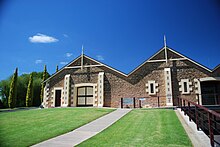Coonawarra, South Australia
| Coonawarra South Australia | |||||||||||||||
|---|---|---|---|---|---|---|---|---|---|---|---|---|---|---|---|
 Coonawarra railway station, looking south | |||||||||||||||
| Coordinates | 37°17′31″S 140°49′59″E / 37.292066°S 140.833031°E[1] | ||||||||||||||
| Population | 135 (SAL 2021)[2] | ||||||||||||||
| Established | 13 December 2001 (locality)[3] | ||||||||||||||
| Postcode(s) | 5263[4] | ||||||||||||||
| Elevation | 57 m (187 ft)[5] | ||||||||||||||
| Time zone | ACST (UTC+9:30) | ||||||||||||||
| • Summer (DST) | ACST (UTC+10:30) | ||||||||||||||
| Location |
| ||||||||||||||
| LGA(s) | Wattle Range Council | ||||||||||||||
| Region | Limestone Coast[1] | ||||||||||||||
| County | Robe[1] | ||||||||||||||
| State electorate(s) | MacKillop[6] | ||||||||||||||
| Federal division(s) | Barker[7] | ||||||||||||||
| |||||||||||||||
| |||||||||||||||
| Footnotes | Locations[4] Adjoining localities[1] | ||||||||||||||
Coonawarra is a small town north of Penola in South Australia. It is best known for the Coonawarra wine region named after it.
The Aboriginal Australians living in the area when Europeans arrived were the Bindjali people,[8][9] The word coonawarra is reported to have been their word for honeysuckle,[10] although this meaning has also been ascribed to Penola by the same source.[9] An alternative origin to the name is still rooted in the local indigenous language: “The name of John Riddock’s fruit colony, started by him in 1895. “Coon” being the aboriginal word for “big lip”, and “warra,” for “house,” and was applied by natives to a house in the locality in which a man with a remarkably big lip lived”[11]
Coonawarra was a station on the Mount Gambier railway line, which opened in 1887 and operated until it closed to freight on 12 April 1995. The Limestone Coast Railway tourist trains stopped at the station from Mount Gambier until 20 March 1999.[citation needed]

The township of Coonawarra is a few hundred metres west of the Riddoch Highway which passes along the ridge in the middle of the Coonawarra wine region. The historic Wynn's Coonawarra Winery in Memorial Drive is listed on the South Australian Heritage Register.[12]
References
- ^ a b c d "Search results for "Coonawarra, LOCB" with the following datasets selected – 'Suburbs and Localities', 'Counties', 'Local Government Areas', 'SA Government Regions', 'Railways', 'Roads' and 'Gazetteer'". Location SA Map Viewer. South Australian Government. Retrieved 8 December 2018.
- ^ Australian Bureau of Statistics (28 June 2022). "Coonawarra (SA) (suburb and locality)". Australian Census 2021 QuickStats. Retrieved 28 June 2022.
- ^ Lawson, R. (13 December 2001). "GEOGRAPHICAL NAMES ACT 1991 Notice to Assign Boundaries and Names to Places (in the Wattle Range Council)" (PDF). The South Australian Government Gazette. South Australian Government. p. 5365. Archived from the original (PDF) on 19 October 2022. Retrieved 27 February 2018.
- ^ a b "Coonawarra, South Australia (Postcode)". postcodes-australia.com. Retrieved 8 December 2018.
- ^ a b c d "Summary statistics COONAWARRA". Bureau of Meteorology. Australian Government. Retrieved 7 December 2018.
- ^ "District of MacKillop Background Profile". Electoral Commission SA. Retrieved 29 March 2016.
- ^ "Federal electoral division of Barker" (PDF). Australian Electoral Commission. Retrieved 28 March 2016.
- ^ "Map of Indigenous Australia". AIATSIS. Retrieved 22 January 2021.
- ^ a b "Penola, SA". Aussie Towns. 6 February 2019. Retrieved 22 January 2021.
- ^ "The History of Coonawarra". Coonawarra Vignerons. Retrieved 22 January 2021.
- ^ Day, Alfred N (1915). Names of South Australian Railway Stations with Their Meanings and Derivations. Adelaide: South Australian Railways [R E E Rogers, Government Printer]. p. 8.
- ^ "Wynn's Coonawarra Winery". South Australian Heritage Register. Department of Environment, Water and Natural Resources. Retrieved 26 August 2016.

